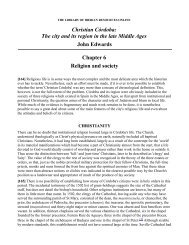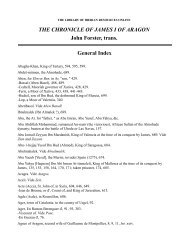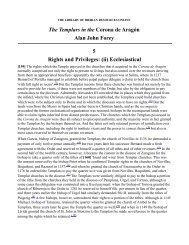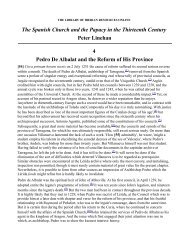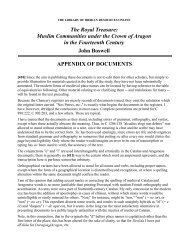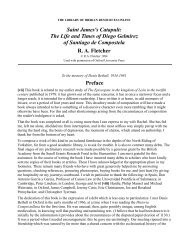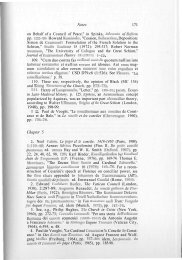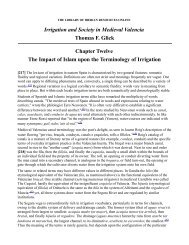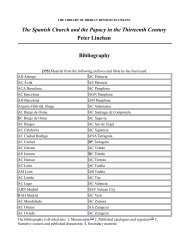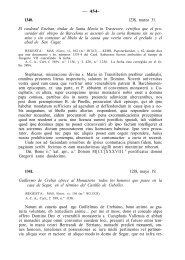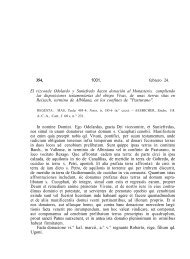PROTESTANTISM - The Library of Iberian Resources Online
PROTESTANTISM - The Library of Iberian Resources Online
PROTESTANTISM - The Library of Iberian Resources Online
Create successful ePaper yourself
Turn your PDF publications into a flip-book with our unique Google optimized e-Paper software.
he predicted that in three years the world would be drowned in blood. He was probably an Anabaptist<br />
and, when on trial, he admitted that he had visited Martin Luther to learn whether the Lutheran sect<br />
possessed the truth. <strong>The</strong> tribunal referred the case to the Suprema, which replied that, if he held any<br />
Lutheran errors, justice should be done; if not, the case was trifling and a hundred lashes would suffice.<br />
<strong>The</strong> papers are imperfect and we can only gather that he denied Lutheranism and escaped with the<br />
scourging. (17)<br />
Cases <strong>of</strong> this kind were doubtless occurring in the various tribunals, but it was some time as yet before<br />
systematic action was taken by the Inquisition. Clement VII addressed a brief, May 8, 1526, to the<br />
Observantine Franciscans, empowering them to receive all Lutherans desiring to return to the Church,<br />
who were to be reincorporated on accepting salutary penance, and to be absolved and relieved from all<br />
the penalties decreed by Leo X and by others. (18) This was evidently designed for temporary effect in<br />
Germany and, although sent to Spain, it was too subversive <strong>of</strong> the exclusive jurisdiction <strong>of</strong> the<br />
Inquisition to be observed there. <strong>The</strong> earliest action <strong>of</strong> the Suprema to protect Spain from the<br />
dissemination <strong>of</strong> the new heresies would seem to be a letter, in 1527, to the provisor <strong>of</strong> Lugo and to the<br />
Dominican provincial and Franciscan guardian there, about the heretics arriving at the Galician ports,<br />
and ordering them to enquire after Lutheran books, which they were required to seize. (19) Coruña was<br />
one <strong>of</strong> the chief ports <strong>of</strong> commerce with the northern seas, thus calling for special watchfulness, and,<br />
though a tribunal had recently been provided for Galicia, apparently on this account, it seems not to<br />
have been in working order. Still the heretics continued to come, and the Suprema issued, April 27,<br />
1531, a carta acordada instructing the tribunals to publish special Edicts <strong>of</strong> Faith requiring the<br />
denunciation <strong>of</strong> persons suspected <strong>of</strong> holding Lutheran opinions. (20) Apparently [423] the time had<br />
arrived when some definite position with regard to the growing danger had to be taken; there seems to<br />
have been doubt felt as to the authority <strong>of</strong> the Inquisition to deal with it, and as to the policy to be<br />
observed towards these heretics, for a brief was procured, July 15th <strong>of</strong> the same year, from Clement VII<br />
empowering Manrique and his deputies to proceed against the followers <strong>of</strong> Martin Luther, their fautors<br />
and defenders, and a clause to this effect continued subsequently to be included in the commissions <strong>of</strong><br />
the inquisitor-general. <strong>The</strong> brief moreover extended Manrique's personal jurisdiction, for this heresy,<br />
over archbishops and bishops, although these were not to be arrested and imprisoned; impenitents were<br />
to be relaxed, in accordance with the canons, while those who sought reconciliation were to be<br />
admitted, with due punishment, and could even be dispensed for irregularity and be relieved <strong>of</strong> all<br />
disabilities and note <strong>of</strong> infamy. (21) <strong>The</strong>re was evidently as yet a disposition to treat these new heretics<br />
with special tenderness.<br />
For some time as yet the labors <strong>of</strong> the Inquisition, in the suppression <strong>of</strong> Lutheranism, were confined to<br />
foreigners, the most conspicuous <strong>of</strong> whom was Hugo de Celso, a learned Burgundian doctor <strong>of</strong> both<br />
laws and author <strong>of</strong> a serviceable Repertorio de las Leyes, which saw the light at Valladolid in 1538 and<br />
again at Alcalá in 1540. In 1532 he seems to have been prosecuted without conviction at Toledo, but<br />
fell again under suspicion and was finally burnt in 1551. (22) It is true that Queen Mary <strong>of</strong> Hungary,<br />
sister <strong>of</strong> Charles V, did not escape suspicion, (23) but the earliest undoubted heretic recorded <strong>of</strong> Spanish<br />
blood would seem to be Francisco de San Roman <strong>of</strong> Burgos. Engaged, while still a young man, in<br />
business in the Netherlands, his affairs took him to Bremen, where he was converted and became so<br />
ardent a proselyte that, after various adventures, he undertook to convert Charles V at Ratisbon.<br />
Persisting in the attempt, he was sent in chains to Spain and, as he refused to recant, there was nothing<br />
to do with him save to give him the fiery death that he courted-- the first <strong>of</strong> the few Spanish martyrs to<br />
Protestantism. Carranza attended him at the stake and urged him to submit to the Church, but the<br />
ferocious crowd pierced him with their swords--a not [424] infrequent occurrence at the autos de fe. We



